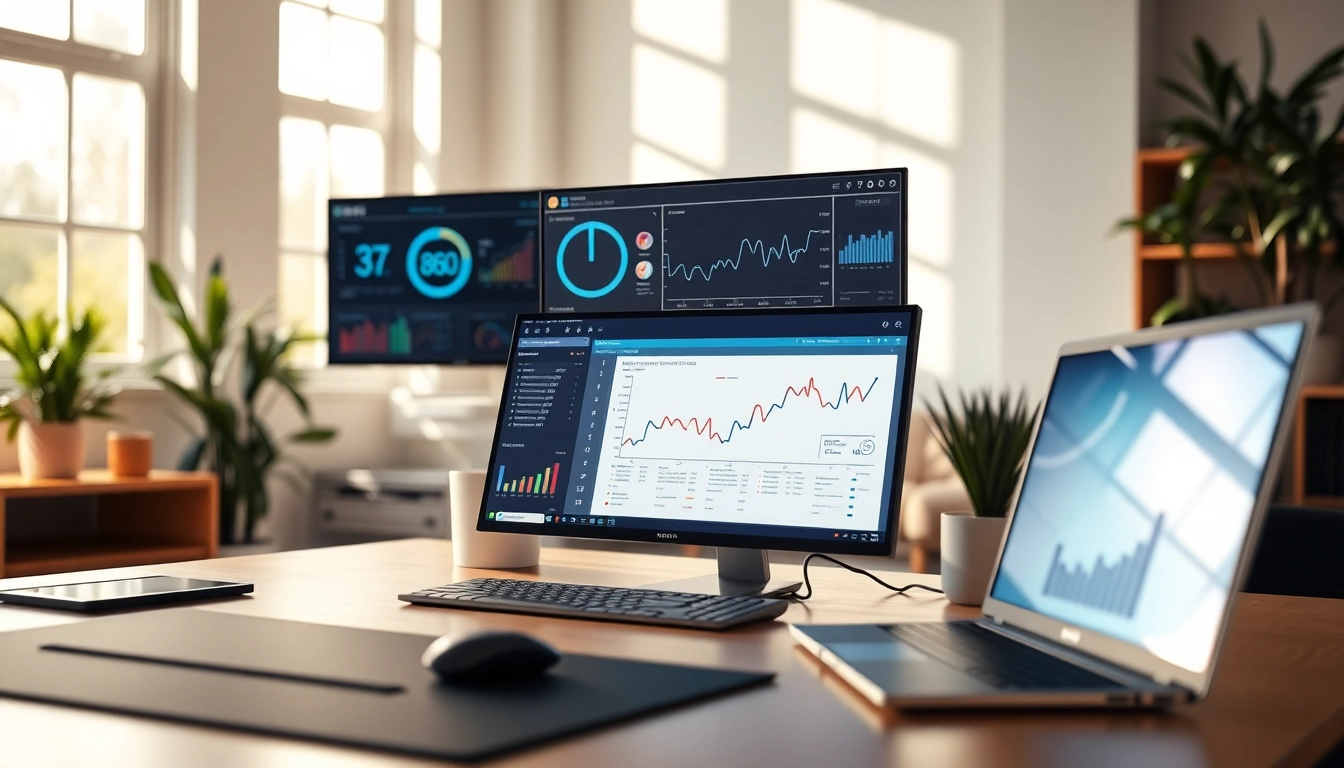The Role of Site Reliability Engineering Experts
In a world where digital services must be consistently available and performant, the role of Site reliability engineering experts has never been more crucial. These professionals bridge the gap between software development and operations, ensuring that systems run smoothly and efficiently. As organizations continue to migrate to cloud infrastructures and adopt DevOps practices, understanding the pivotal functions of these experts is essential for any tech-driven business.
Understanding Site Reliability Engineering
Site Reliability Engineering (SRE) is a discipline that incorporates aspects of software engineering and applies them to infrastructure and operations problems. The primary goal is to create scalable and reliable software systems. SRE originated at Google as a means to ensure the reliability of its services while also enabling rapid releases by applying software engineering principles to system administration tasks.
Key Responsibilities of Site Reliability Engineering Experts
Site reliability engineering experts are tasked with a variety of responsibilities, all aimed at enhancing system reliability and performance. These include:
- Monitoring and Observability: Implementing advanced monitoring systems to provide insights into application performance and user experiences.
- Incident Response: Quickly addressing system failures or performance degradation through systematic incident management.
- Capacity Planning: Ensuring that systems can handle both current and future loads without performance degradation.
- Service Level Objectives (SLOs): Defining and measuring performance targets to ensure systems meet reliability standards.
The Importance of SRE in Modern IT
As technology adoption accelerates, the importance of SRE becomes more pronounced. SRE practices facilitate faster delivery of software while maintaining service reliability. By prioritizing automation, SRE can reduce manual workloads and minimize human error, which are significant factors contributing to system failures. Moreover, as businesses increasingly rely on cloud services, SRE experts play a vital role in managing the complexities associated with scalability and distributed systems.
Essential Skills for Site Reliability Engineering Experts
Becoming a successful site reliability engineering expert requires a blend of technical and soft skills. Mastery of specific competencies is essential, allowing these professionals to navigate the challenges of modern IT environments effectively.
Technical Proficiency and Tools Used
Technical skills stand at the forefront of site reliability engineering. Experts are required to have a strong grounding in various programming languages such as Python, Go, or Java, alongside an understanding of system architecture. They utilize numerous tools and technologies, including:
- Monitoring and Alerting Tools: Platforms like Prometheus, Grafana, and Datadog are critical for real-time monitoring of systems.
- Container Orchestration: Proficiency in using Kubernetes and Docker for managing containerized applications effectively.
- Configuration Management: Familiarity with tools like Ansible and Terraform for automating infrastructure management.
- Cloud Technologies: Knowledge of AWS, Azure, and GCP is essential due to the shift toward cloud-native architectures.
Soft Skills That Enhance SRE Effectiveness
Beyond technical prowess, soft skills are equally essential for site reliability engineering experts. These professionals must navigate organizational dynamics, lead incident response efforts, and communicate effectively across teams. Key soft skills include:
- Collaboration: The ability to work closely with developers, product managers, and other stakeholders to resolve issues and enhance system performance.
- Problem-Solving: Skilled in troubleshooting complex systems, enabling quick resolutions to incidents.
- Adaptability: Being open to learning new technologies and methodologies as the tech landscape evolves.
Continuous Learning in Site Reliability Engineering
The technology landscape is always shifting, making continuous learning non-negotiable for site reliability engineering experts. Engaging in professional development activities, such as attending workshops, obtaining certifications, and participating in tech communities, is crucial. Staying updated with industry trends, best practices, and new tools ensures that SRE specialists can implement the most effective strategies for their organizations.
Best Practices in Site Reliability Engineering
Implementing best practices within site reliability engineering can significantly enhance system performance and reliability. By adhering to established methodologies, organizations can improve their operations.
Implementing Effective Monitoring Solutions
Continuous monitoring helps detect issues before they escalate into significant failures. Effective monitoring solutions should include:
- Real-Time Monitoring: Utilize tools that provide immediate visibility into system performance, enabling proactive incident responses.
- Alerts and Thresholds: Set alerts based on defined performance thresholds to ensure timely notifications when issues arise.
- User Experience Monitoring: Implement tools for real user monitoring to understand how end-users are interacting with the application.
Incident Management and Response Strategies
An effective incident management strategy is vital for minimizing downtime. Best practices include:
- Incident Response Plans: Establish clear procedures for identifying, diagnosing, and resolving incidents.
- Postmortem Analysis: Conducting thorough post-incident reviews to learn from failures, documenting findings and lessons learned for future reference.
- Communication Protocols: Define how and when to communicate with stakeholders during an incident to keep everyone informed.
Building Reliable and Scalable Systems
System reliability and scalability are paramount. Experts should focus on:
- Redundancy: Architect systems to include redundancy in critical components to prevent single points of failure.
- Load Testing: Regularly perform load and stress tests to ensure systems can handle projected traffic spikes without degradation.
- Microservices Architecture: Utilize microservices to enable flexibility and ease of scaling applications based on demand.
Challenges Faced by Site Reliability Engineering Experts
Despite their importance, site reliability engineering experts face various challenges in their roles. Understanding these challenges is critical for developing strategies to mitigate them.
Common Operational Challenges
Operational challenges can hinder service reliability. Common issues include:
- Complexity of Systems: Managing interconnected services can complicate incident resolution efforts, requiring careful coordination.
- Technical Debt: Legacy systems may drag down performance and create inefficiencies, necessitating a thoughtful approach to modernization.
- Resource Constraints: Tight budgets and limited personnel may restrict the ability to adopt new tools or practices effectively.
Balancing Reliability with Agility
Achieving the sweet spot between system reliability and the agility of development teams is a persistent challenge. Practices that can help include:
- Implementing SLOs: Setting service level objectives that align with business priorities ensures that teams focus on key reliability goals.
- Emphasizing Automation: Automating repetitive tasks reduces manual error and accelerates deployment processes without sacrificing reliability.
- Encouraging a Culture of Collaboration: Foster collaboration between development and operations teams to ensure shared goals and responsibilities.
Mitigating Risks in Complex Environments
In increasingly complex environments, risk management is integral. Experts can manage risks through a combination of strategies:
- Robust Testing Practices: Implementing comprehensive testing methodologies to identify vulnerabilities before deployment.
- Failover Strategies: Having contingency plans in place to provide immediate fallback options during system failures.
- Regular Audits: Conducting frequent security and compliance audits to identify potential risks and rectify issues proactively.
Future Trends for Site Reliability Engineering Experts
The future of site reliability engineering is being shaped by numerous emerging trends. SRE experts must stay abreast of these developments to maintain a competitive edge in the landscape.
The Impact of AI and Automation
Artificial intelligence and automation are poised to revolutionize site reliability engineering. AI can significantly enhance analytical capabilities, enabling experts to:
- Predict Failures: Employ machine learning algorithms to predict and prevent system failures based on historical data trends.
- Automate Incident Management: Utilize AI-driven tools to streamline and expedite responses to incidents, reducing downtime.
- Optimize Resource Allocation: Leverage AI to dynamically manage resources, ensuring optimal system performance as demand fluctuates.
Shifting Toward a DevOps Culture
The integration of DevOps practices continues to influence site reliability engineering. A DevOps culture emphasizes:
- Shared Responsibility: Instilling a sense of ownership for reliability across all teams, promoting cross-functional collaboration.
- Continuous Delivery: Deploying software in smaller, more manageable updates to reduce the risk of large-scale failures.
- Feedback Loops: Establishing mechanisms for rapid feedback on system performance, enabling timely improvements and adaptations.
Emerging Technologies in Site Reliability Engineering
New technologies will undoubtedly emerge and redefine best practices in site reliability engineering. Keeping an eye on trends such as:
- Serverless Architectures: As organizations embrace serverless computing, SRE experts must adapt their strategies to optimize for this model.
- Observability Tools: Advancements in observability technologies will provide deeper insights and better analytics for performance management.
- Infrastructure as Code (IaC): Utilizing IaC practices will gain traction, enabling more robust and automated infrastructure management.



